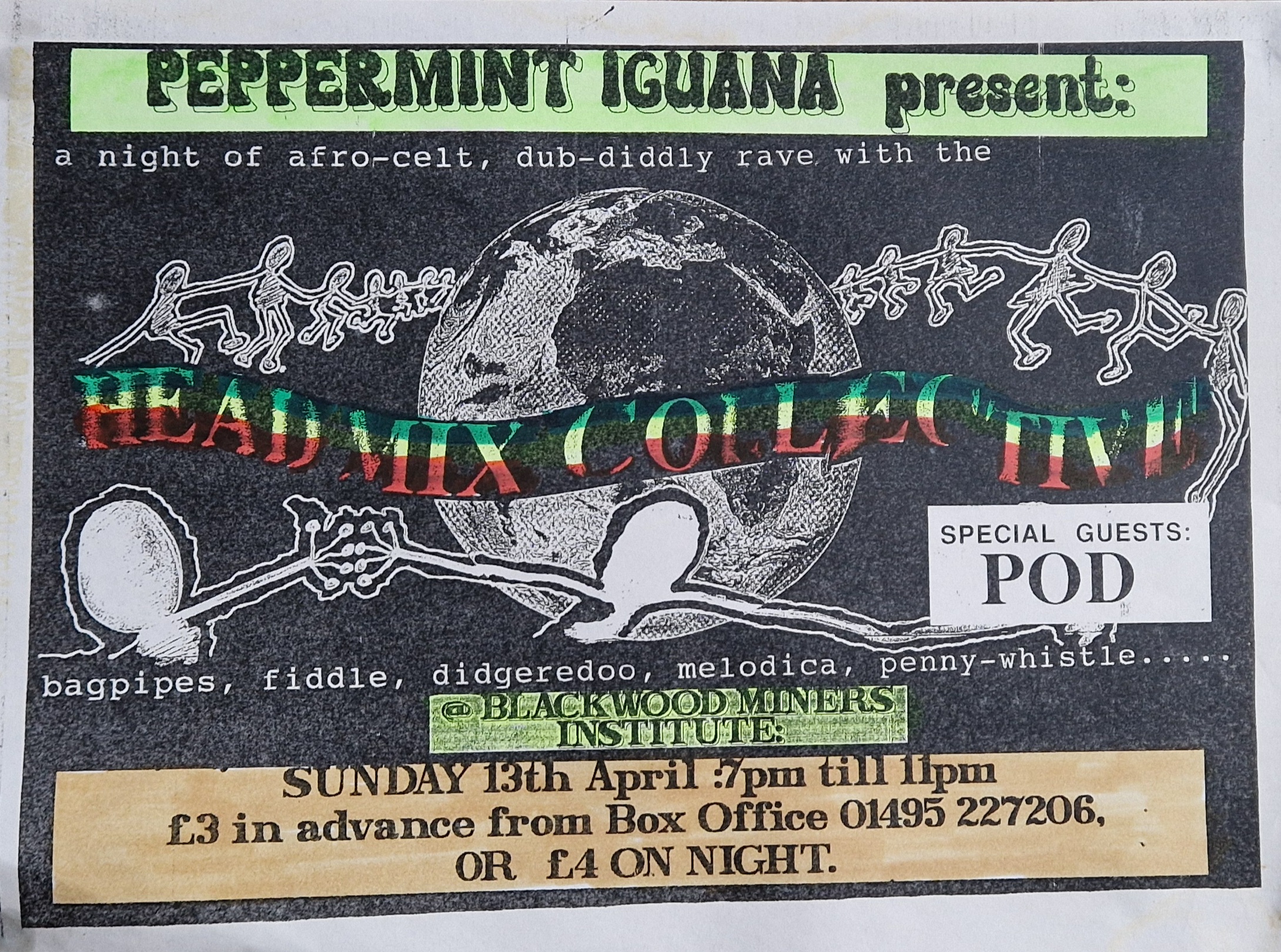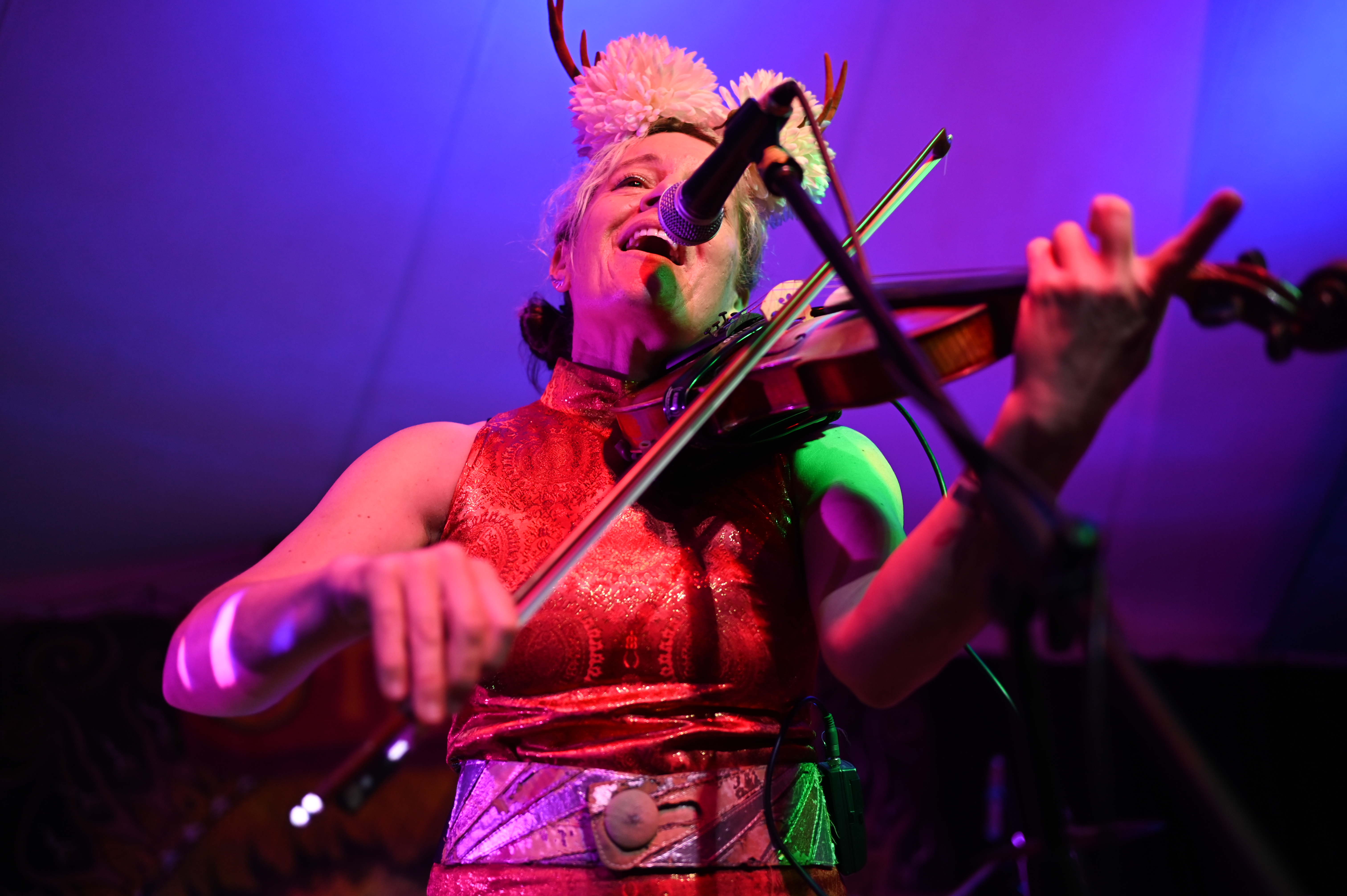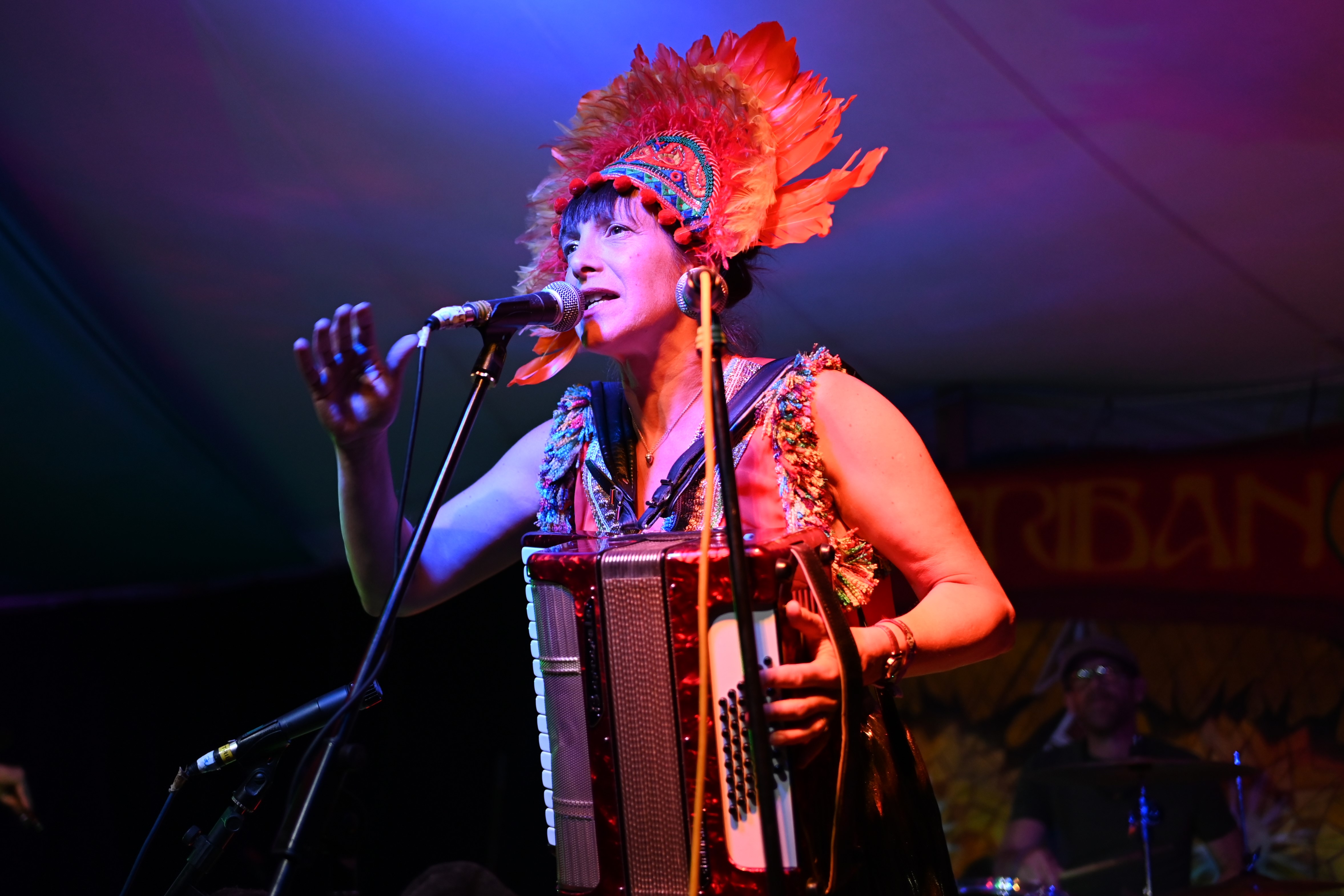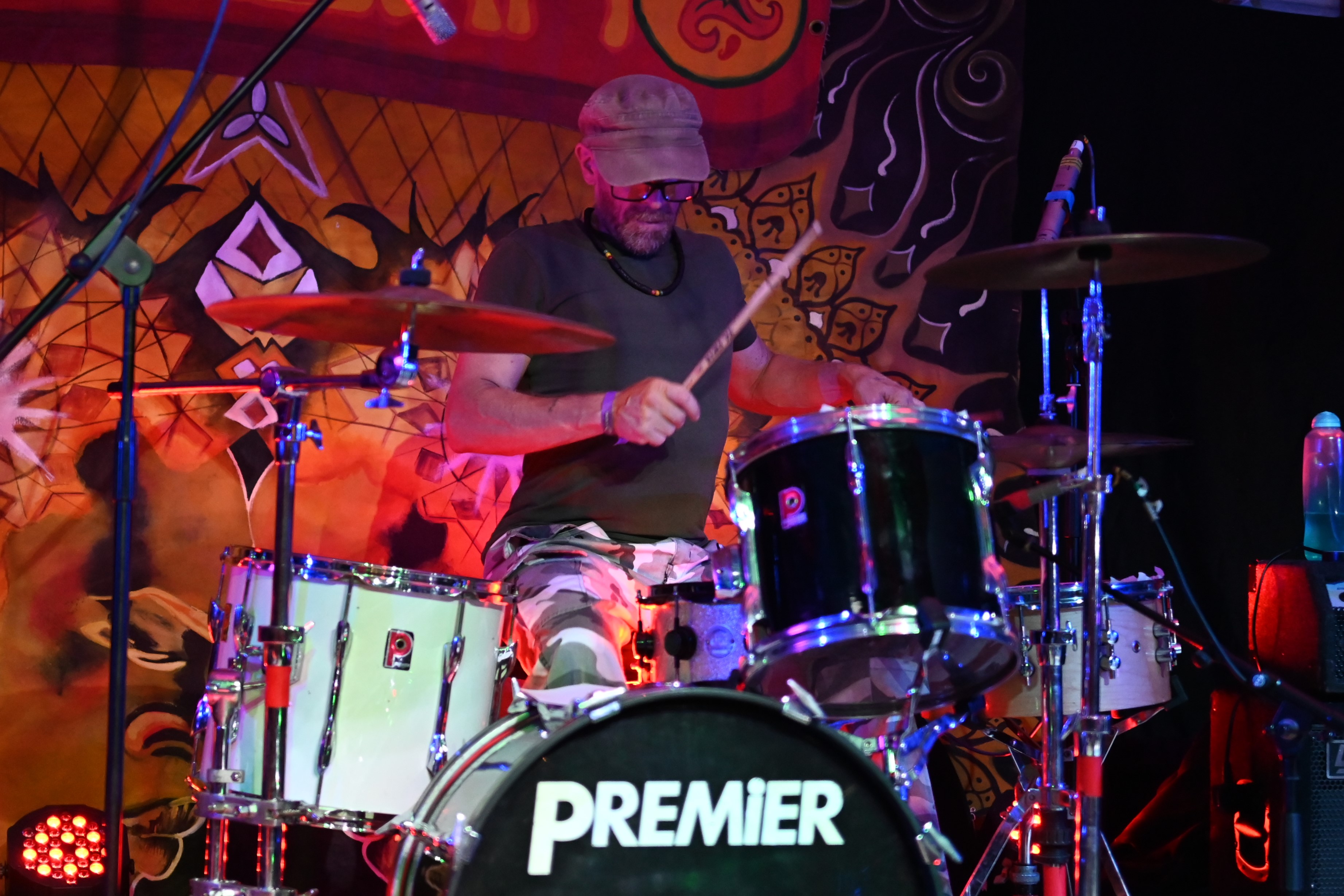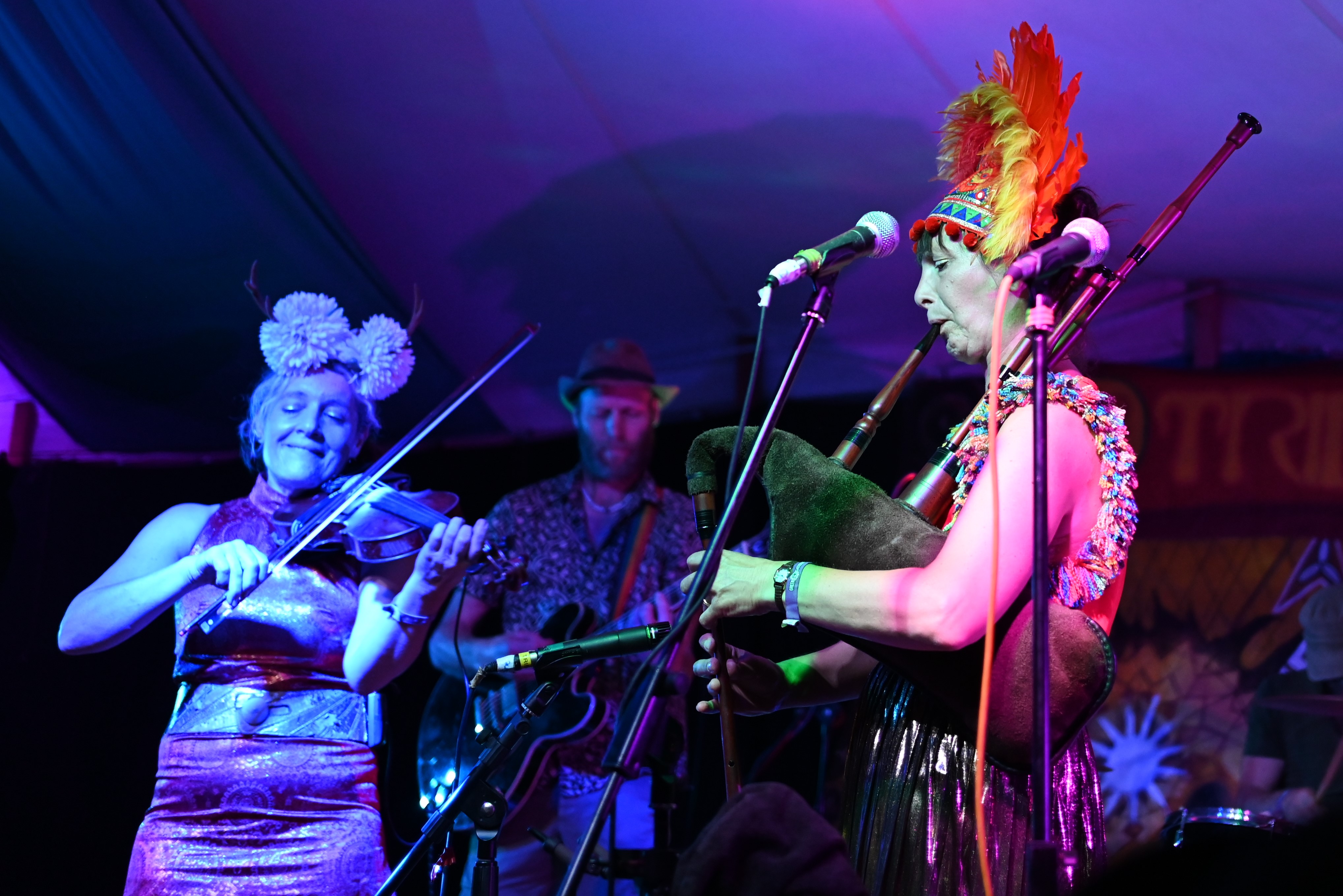 At this year’s Green Gathering festival, we got to sit down backstage with Ed and Paul, Headmix bassist and Drummer, respectively.
At this year’s Green Gathering festival, we got to sit down backstage with Ed and Paul, Headmix bassist and Drummer, respectively.
The following is a summary of our chat.
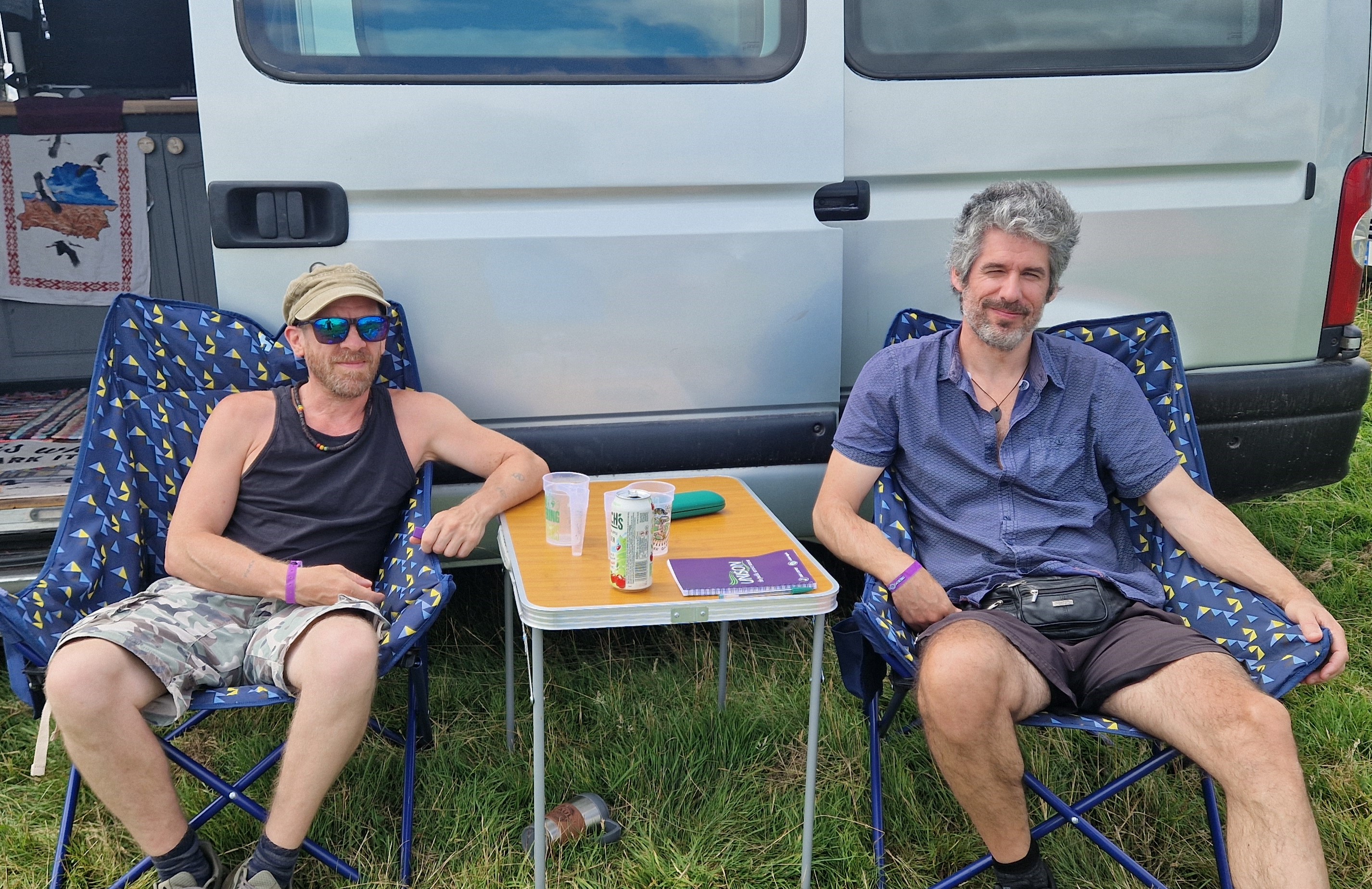
Peppermint Iguana and Headmix first crossed paths before Headmix had really become a thing. The first time I ever spoke to Ed was at a festival in Mid Wales. Probably around 1995 (ish). I had booked Ed’s then band, Doo The Moog, to play a gig with the Tofu Love Frogs in Blackwood Miners’ Institute.
I had booked the gig through Chris Tofu, who was just starting to branch out from his role of percussionist with the Tofus, and setting up the now well-established Continental Drifts Booking Agency.
I was wandering around the festival handing out flyers for the gig and bumped into Ed. I presented him with a flyer.
Clearly Chris had not told Ed about this gig because he looked at me and said, “I don’t know anything about this. I got this new thing going called FOG HMC”.
At this point it is worth pointing out that Headmix have changed their name a few times over the years. Ed explains:
ED: FOG HMC, that was really the inspiration of John who used to be the lead singer in Doo The Moog and the FOG was Fools Oracle Girded, so Fools Oracle Girded Headmix Collective was the original name – and it was a bit of a mouthful, not easy to get on flyers in its full name. So that’s why it became FOG HMC and then gradually the name got shorter, first to Headmix Collective, then just Headmix.
John had this thing about fools, he thought that we’re all fools, so it was like the fools- the general people, oracle,, girded- girding your loins ready for action, Fools Oracle Girded. The Headmix, you make of what you want, Collective. With John, a lot of his lyrics were quite ‘out-there’ and I suppose the name was just a reflection of that.
Ed finally got to play Blackwood for us with Headmix Collective in April 1997 and a life long friendship was born.
The Headmix sound is quite unusual and it blends lots of different things to come up with something that’s far more than the sum of the parts. It’s really difficult to describe to anyone that has not heard them. Folk, dub, dance, with fiddles, bagpipes, didgeridoo, accordian, whistles, and the kitchen sink.
Was that driven by any one particular band member, or did you have someone who would bring a bit of dub into it, someone else who would bring a bit of folk into it? It’s hard to imagine lots of different people having the same sort of idea like that.
ED: I was talking to someone about this just the other day who was struggling to understand how we could come up with what we were doing. Back at that time, in the early days of the band, Doo The Moog had just split up, Tofu Love Frogs were slimming down to a smaller band, Cheapsuit Oroonies just split up, and so the people from those bands who wanted to keep things going on the scene got together. Jim, the drummer from Cheapsuit Oroonies, Nuala, the fiddle player from Tofus, myself and John from Doo the Moog. John was with Headmix for about six months before he left.
So we had the foundations for a new band, but it didn’t feel like a band, it just felt like a collection of musicians. Then other people got involved who we just met or gathered along the way like Peni on the bagpipes and Sarah. It didn’t really feel like a band and when we went off on tour around Europe we were just busking and picking up gigs along the way. It wasn’t really like a conventional tour, it felt more like a bunch of musicians playing together.
So in those early days it wasn’t really like anyone’s concept, it was just what everyone brought and how they played. Jim played a lot of reggae and dance beats, chunky beats, like he did with the Cheapsuit Oroonies. I followed his lead, changing my bass style from what I’d done in Doo The Moog, to fit more with that dubby vibe.
And then of course you had Nuala on fiddle, so we immediately had the folk element. That mix of playing traditional folk tunes with rootsy beats and funky beats and dancey beats just seemed to sound good to us. We just went with that, but it wasn’t really something that was ever set down as a concept.
Obviously, when a band line-up changes, you develop your sound a bit. Each time someone new comes into the band the sound changes a little, each individual brings something different. I think with Paul drumming with us over the last few years we’ve gone almost full circle because Paul’s strength is the dub and the reggae sound, he brings that element with his drumming. His style of playing fits great with the sound, that’s why it’s working so well now.
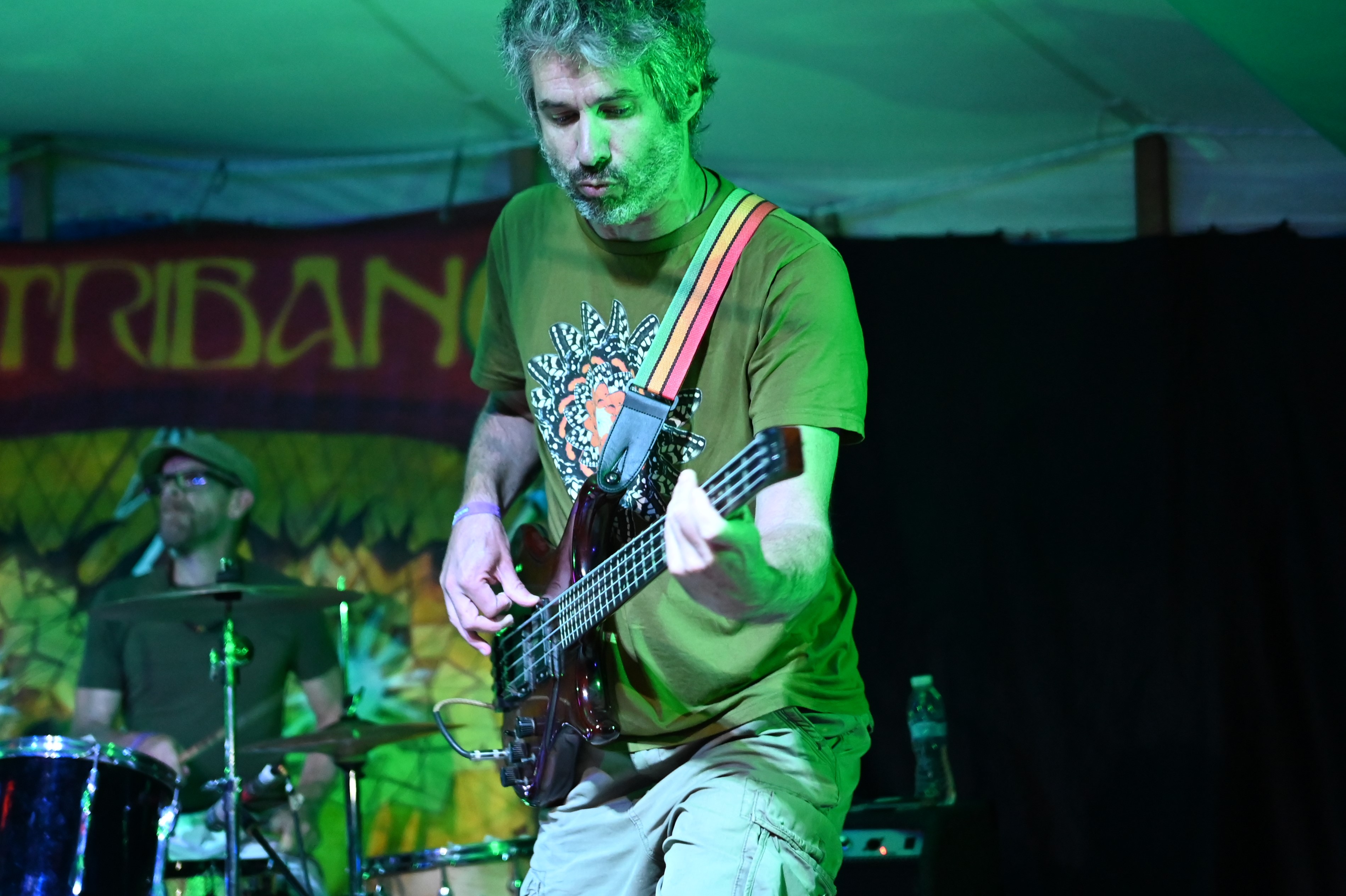
Through all of this Paul is sat quietly listening. He wasn’t part of that original line up, he played with Dubmerge, a Hereford based, eight-piece hip-hop-dub outfit that, by coincidence, replaced Doo the Moog for that gig supporting the Tofu Love Frogs in Blackwood.
I seem to recall that Headmix were almost constantly touring back in the days of the original line-up, was that fun or was it hard work?
ED: Both. These were the days before internet, so organising to tour constantly was hard. We didn’t have emails, social media, venue websites and such. But really, it was a lifestyle we had chosen. We were all in our twenties at the time and it was just the lifestyle we wanted to live. We were all in a position, at that time in our lives, to do that. We didn’t have the responsibilities of houses and mortgages and jobs, so we were able to live that very free lifestyle of doing a gig – and if someone came up to us and asked if we wanted to come and do a gig somewhere else in a few days’ time, we could do it.
Like any band, I feel I could write several books about life on the road. The ‘highs’ – way up here – absolutely what you do it for. It’s not just those moments when you’re on stage and it’s all going great, but times when you’re just spending time together as a band and jamming or just having a laugh together.
There were times when everyone’s tired and wants their own space, but you haven’t got it. You’re all in a van together and those moments are hard, of course they are. In normal life you’d all go your separate ways for a break. But not when you’re on the road in a van together – you don’t have that choice. You’re together, and in a way that makes you stronger because you have to work at it, you have to talk about it – whatever the problem is. You’ve got to find out what’s going on for each other and it makes your relationship stronger. I think because we were living like that, that bond and energy that we had just all comes out in how we played.
And I think we would bring it onto the stage, and it spilled out over to the audience. I think being able to play music when you can’t talk to each other anymore helps, you just relate by just playing music together.
Paul chips in-
PAUL: Yeah, I was in Dubmerge for eighteen years in the same band going up and down the country and around mainland Europe in a little transit van you know, eight of us at a time sometimes just stuck in there. Lots of heated moments, this was back in the day before you had Google Maps, so it was literally trying to read a map in the back of a van, all getting irate and it’s a testament to your character if you can stay together for that long and not kill each other. Yeah, absolutely. But that’s how you make good music together isn’t it.
Do you think the fact that there were girls in the band as well that sort of took blokes on tour edge off it?
ED: Definitely. I mean I was in Doo The Moog for seven years. We did have a female fiddle player, Helen, but it was very much a blokes band because there were six blokes. It was a different dynamic when Headmix first started, there was eight of us and there was four blokes and four women. It was very, very different, but in an amazing way, because I think that the energy, that female energy particularly when females get together and play music and sing together is just like such an incredible energy.
There were times when we were driving down the motorway with me, Jim and John in the back just chatting about whatever we were chatting about, and the four women at the front driving, navigating, singing amazing songs together. Those sort of moments are magic moments. It’s the mix, not just of music but the mix of the energy, the feminine energy that Nuala and Sarah bring to it and then the more masculine energy of the drums and bass and how the rhythm section plays – the aggression that’s in some of the beats and rhythms – the dance beats to get the music pumping is I think, very different. The mix of the energies makes it special.
After the break up of the original version of Headmix and the break up of Dubmerge, Ed and Paul teamed up with Molara, formerly of Zion Train, as her backing band. Paul reflects on that time.
PAUL: I’ve been in both scenarios with blokey bands right up until I met with Molara and we joined with Ed and had the female singers around. I’d never heard that before. I’d be in the dressing room and, like Ed was saying, just listening to the girls practicing their harmonies and stuff. I just used to love it, so calming as well, I mean how can you get all angry around that, it’s just a beautiful thing isn’t it to listen to so, completely different energies.
During the nineties there was an incredible, vibrant, anti-establishment, creative vibe in Brighton that was more than just a music scene like Madchester or Merseybeat, it was a very special place for a few years. I ask if being based in Brighton at that particular time, when it had a certain energy to it, was fuel to the vibe of the band.
ED: Yeah, I guess so, I think it gave us a bit more focus because before we all congregated in Brighton, we’d all been very much spread out around the country and all just travelling around. I think it was Sarah who first settled in Brighton in these old chalets just outside Brighton that had been left abandoned and they squatted them. She just felt like she needed somewhere that was her own space in between gig,s and then as a result it gave us somewhere to practice, it gave us somewhere to congregate and play music.
I think it certainly gave us more of a focus. The living in a van thing, just travelling year after year wasn’t a sustainable thing. Being in Brighton gave us more of a base and it was the first time that we were part of a scene.
The Brighton scene in the mid to late 1990s was great, there was lots of activism there like SchNews and the Levellers. They’re still there, but it felt like a very happening place at that time. The energy in the city at that time was fantastic, so it certainly helped.
As I recall you were the first and possibly still the only non-reggae or dub band, whatever you want to call it, that signed to Zion Train’s label, Universal Egg. How did that come about?
ED: They saw us play at the Frome Festival backstage in 1996 and we’d just been on tour, when we had our first original eight piece line up.
We’d been on tour for about two or three months in Europe and we came back to play the Frome Festival. I think it was beginning of September and without blowing our own trumpet too much, we were on fire – the result of playing so much music together in a short space of time. We’d been playing so much that it was pretty ‘full on’ what we were doing at that time and I think Colin loved it.
Colin and Neil were there and he loved it and I think at the time he wanted to start working with other musicians and bands, just expanding the label a bit. It mostly came from Colin though, he was the one that wanted to work with us. He was dancing his nuts off that night and he came and said he wanted to work with us – so we kept in touch. When we recorded our next album, which was Birthrights, it had quite a big dub reggae influence, so we got asked Zion Train to do some dub mixes. At the time they did a dub mix of Job Creation and some other dub mixes as well which haven’t been released. Then that led to them signing us for the album ‘Reach Out’. It was released in 2001, but it was in the making really from 96.
I don’t particularly want us to get heavy-ish, but I seem to recall around about the time the band split up, there was an incident on the motorway, was that pivotal to the band deciding to call it a day?
ED: Pivotal was probably a bit too strong, I mean the thing is, we had actually two motorway accidents. We had one which was probably the more well-known one in 2000 which was in the horse box. And then almost a year to the day after that we were on the M25 and again completely taken out by a juggernaut and that was pretty bad as well.
It psychologically affected some members of the band more than others. For a good time after that some of the band didn’t want to travel at all on the road, they were getting trains to gigs, and it certainly changed in terms of what gigs we took. We were more choosey about what gigs we took, so if we were going to get on the road and carry on doing gigs, we weren’t going to drive four hours to do a gig for £100 or the like – which inevitably means that you’re gigging a bit less, so it changed the way the band worked.
I think it just made people think more about why they were doing it, but I wouldn’t say it was the main reason that we decided to split up at that time, but it didn’t help. But it is fair to say that from an emotional and psychological point of view at the time, those two accidents definitely didn’t help.
SarahAnd then I blinked and you were living in Mid Wales. Are you from Wales originally?
ED: No, I’m from Stoneleigh, just north of Epsom. In those days when I’d been on the road and we had a bit of a break, that’s where I used to go to chill out, Mid Wales. There were a lot of people involved in the festival scene who were putting up tents, lights and such, the backstage crew, they all seemed to be from around Llanidloes. It seemed to crop up a lot, it’s like, oh yeah we’re from Llanidloes, tent crew, oh yeah we’re from Llanidloes.
There was a lot of parties going on round there, so I was getting invitations all the time to go and chill out there – “oh yeah, you’ve got a couple of weeks off, come and chill”. So I did, that’s where I went and relaxed.
So when I felt the time was right for me to move out of Brighton with my partner at the time – we wanted to settle down and we couldn’t afford to do it in Brighton, Llanidloes just seemed a good place to go. These things are just how the universe works.
Whilst in Mid Wales, Ed started a band, Roots Oracle. Is that still a thing?
ED: I guess so, I’ve never sort of said, ‘oh, it’s never going to be a thing again’. It was inevitable I was going to get a band together to keep making music. Then Headmix started again and that took over.
I called Paul about doing some Roots Oracle stuff. But Steve, who’s the studio guy with Roots Oracle, lived in Llanidloes, I met him in Llanidloes but he started moving further west. He went to Aberystwyth, and now he’s down near Aberaeron.
Then Steve got to the stage where he wanted to get more into his photography, which is his main love. So he hasn’t done much studio stuff over the last few years. He actually gave me a call about a month ago, and said, “oh, I’ve just got the studio set up, so if you want to do some more stuff.” I’ve definitely got some tunes that are more suitable for the Roots Oracle thing than Headmix.
I’d never rule it out, I really enjoyed doing those two albums with Steve. It was something I’d always wanted to do. Just do the more Rootsy stuff.
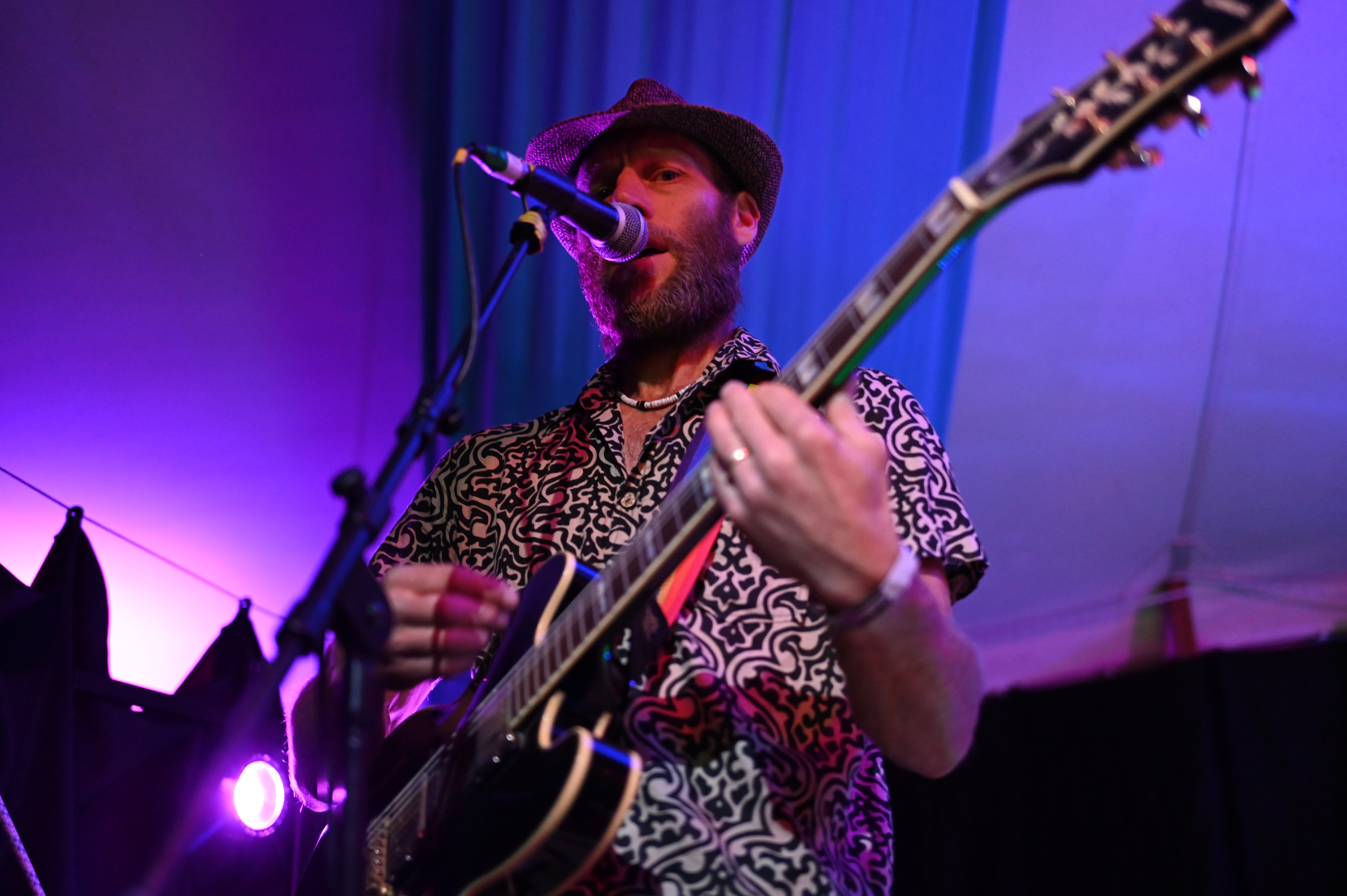
And then Headmix comes back together. You resisted reforming quite a while, but whose idea was it to get back together then?
ED: We split in 2000. I think it was in 2013, 2014, we did two seasons of gigging. I was back in Brighton for my fortieth, and everyone came along to that, my old mates in Brighton. You have a few drinks, and say “yeah, let’s get back together”, in a sort of Blues Brothers type way. Seemed like a good idea at the time.
So we did, for two seasons. But with where everyone’s lives were at, we weren’t writing new stuff. We just went out for two seasons and did our old material.
Then I was like, that’s enough of that for me. I thought if we’re going to really reform, I want to do some new material. That’s the lifeblood of a band. That’s the fuel that gives the band energy to keep going forward. You can’t just keep doing your old stuff. So yeah, I think we just had some conversations during lockdown, and we all felt quite inspired.
Now we’re at a time in our lives where we felt like we wanted to get back together again and write. And initially, that’s what we did. We just got back together for a summer in 2021.
It was like, let’s just get together and write and see what happens. And the writing sessions and being back together again was such a nice experience that we thought, yeah, let’s record an album.
Of course, gigs follow, and one thing leads to another. But it’s been great doing some new stuff.
We’ve got a new-ish album, ‘In Our Time’, that’s a couple of years old now, and we’ve got two singles out this summer. One of them, is being released here at Green Gathering.
But we haven’t recorded a new album since ‘In Our Time’, it’s difficult with me being up in Wales and Paul in Worcester, recording a whole new album is a big undertaking, both time, energy and financially. Particularly the way things are these days with Spotify You don’t get that money back, so it’s a big undertaking.
We decided to record these two tunes, ‘Seven Generations’ and ‘Land Love’, and we’re planning to release something else in the near future.
New tunes tend to come together really quickly, so when we do get together, we make sure it counts, because we are so far apart. I think when we did ‘In Our Time’, we wrote it acoustically, because Paul wasn’t in the band at the time, and Bugs, who was our drummer, couldn’t come to most of the rehearsal sessions. So that album has got a bit more of an acoustic feel, because it wasn’t written with a drummer in the room. That’s how it was for that album, and I’m really happy with how that album came out. But it’s nice that the last two tunes we wrote all together as a band – it’s nice to write like that as well.
So, obviously it’s a different line-up to the 90s version. Were all the original members contacted to see if they wanted to come back?
ED: No and yes. I think you just know that some, they’ve moved on to other things, and some, just geographically, it’s not going to be possible.
I think with Olly, Sarah’s partner, playing guitar, he could play all the stuff, so it was really just a case of getting a drummer.. Dougie (former drummer), I think he’s living up in Dundee now, so we contacted Bugs, who was our drummer for the ‘Birthrights’ album. He drummed with us for a year in 1997 and also the re-union in 2013/14 – so he was who we originally contacted and recorded ‘In Our Time’ with, but he just couldn’t carry it on, so that’s when I contacted Paul.
But there’s been a lot of people in and out of the band in the past – but this time we wanted to keep it to a tight five piece. We thought if we get the right drummer, we can do what we need to do with a five piece.
We’ve seen Tony a couple of times, and we asked Tony to come and do some didge, but he wasn’t keen to do that. But yeah, Paul’s part of the furniture now.
Paul keeping the beat at the backOn the subject of drummers, now is as good a time as any to bring in Paul, who has been sitting mostly quietly listening to Ed. We ask what happened between Dubmerge and Headmix, what were you up to?
PAUL: Well, Headmix and Dub Merge used to tour around the same circuits back in the 90s. We were always bumping into each other in Dutch squats or some crazy obscure squat somewhere in Belgium or somewhere.
We were together for eighteen years, but we went through many members. We kind of just played ourselves out. Lofty, the bass player for Dubmerge, he’s now the lead singer for Last Tree Squad. That’s what he wanted to do, he wanted to become the front man and do all that. He went off and started that.
I got my own thing together called Ital Audio with a different bass player. We just naturally went our separate way like that. Then I went off and did various different bands.
I did a collective in Birmingham called Overproof Sound System. We joined forces and turned that into a band, and that was really good for a while.
ED: The connection really does go back that far – the connection goes back to the early 90s. I used to see Paul all the time when we were doing gigs together and be impressed by his drumming.
So when the question came up of a drummer for Molara’s band, I was like, well, I’ve never worked with Paul, but he’ll definitely be able to do it.
Then obviously through working together on that, I thought of him when we got Headmix back together, I gave him a call, but initially he couldn’t do it.
PAUL: Well, I was actually drumming for Last Tree Squad in Lofty’s band for a while. And I was doing another three-piece reggae band that we were doing, so I was quite busy.
ED: But then I think I asked you again, and then you said yeah.
PAUL: Yeah, the time was right for me, definitely. So yeah, nearly three years ago now you gave me that phone call.
ED: In terms of clocking someone on stage like you do when you’re in a rhythm section, or if you’re a bass player, you’re always clocking drummers. Paul’s clocking bass players.
PAUL: Yeah, we were clocking each other on the sidelines.
ED: Back in the 90s, we were seeing each other doing gigs together.
PAUL: Oh yeah, I always used to admire Headmix along the way. Definitely go and watch Headmix – it was a thing to go and watch, even for us. We were quite snooty about who we watched and stuff at the time.
It was a natural progression really, wasn’t it? Eventually, after thirty years odd or something, we did. Eventually got it together. Yeah, we joined forces.
Most of the times I’ve seen Headmix has been at festivals. Would you call yourself a festival band?
ED: I don’t know if we’d call ourselves a festival band – maybe everyone else would. The type of music that we play is good festival music – but I like playing venues as well. When you get a good venue and you get the sound right, it’s brilliant. At festivals you get half an hour – set up and play without a proper soundcheck. It can be a bit rough around the edges sometimes.
For venue gigs, you get a sound check – you can get it sounding really nice. If you’ve got a crowd there, particularly if they’re there specifically to see you, rather than they just happen to be at a festival your playing at, and it’s a good venue and it’s packed, you can have storming gigs in venues.
There are a lot more festivals now than back in the day. In the old days we would see other bands like Tarantism, Bagdaddies, Tragic Roundabout, you’d see them at a festival and then you’d be like, “we’ll see you next week at the next one”. You’d all be going to the next one and then the one after that.
Now there’s a choice of two or three on the same weekend. It was different back then, but we go down well at festivals and I think most people probably have discovered us through festivals.
Tonight will be the first time I’ve seen you since you reformed. Is it mostly the newer material or do you bring out some of the old favourites?
ED: Oh yeah, it’s a mix. They’ve been really good to us here. They’ve given us a nice long set. They’ve given us ninety minutes, which is nice. Most festivals, you get an hour and it’s, bash it out and it feels like it’s over in five or ten minutes to us.
This conversation could go on for another couple of hours, it is so long since we have caught up. But for practical reasons we wind up and slowly drift apart.
That night, I am genuinely excited at the prospect of seeing the band after such a long time, although excitement is tempered by anxiety. They were so good back in the day I am worried that they might not live up to my expectations and spoil the memory of Headmix. I needn’t have worried, they absolutely smashed it, like only Headmix ever could. Can’t wait to catch them again.
